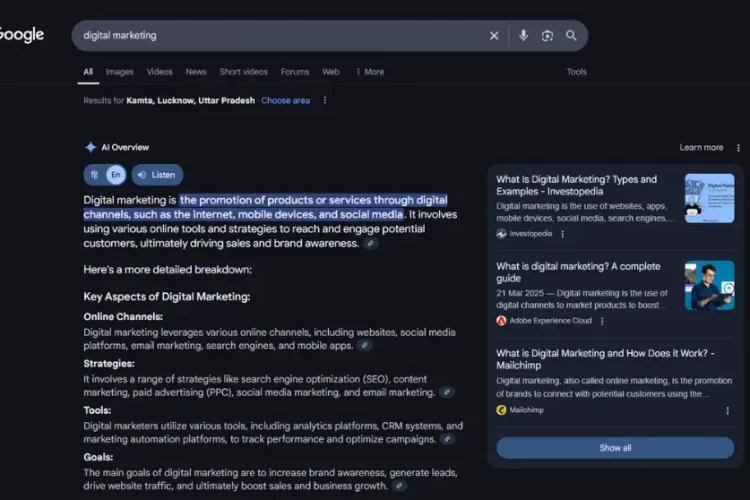
Nowadays, more and more customers use search engines to locate businesses near them. This presents a golden opportunity for local businesses to attract new customers and establish themselves as the go-to option. Here’s where local SEO (Search Engine Optimization) and geo-targeting come into play and this where best growth marketing agencies can be invaluable partners. By implementing these powerful strategies, you can ensure your business appears at the top of local search results, driving more traffic and boosting sales.
Local SEO Google: Optimizing Your Presence for Local Search
Local SEO on Google focuses on making your business very easy to find for people conducting nearby searches. Imagine it like putting up a giant neon sign that says “Hey, I’m a [your business type] right here in [your area]!”
Here’s the breakdown:
Local: Focus is on attracting customers in your city, town, or neighborhood.
SEO: SEO stands for Search Engine Optimization, which essentially means making Google recognize that your business is relevant to local searches.
So, when someone searches for something like “plumber near me” or “[your service] + [your city],” your business shows up high in the search results. This helps you get more calls, website visits, and ultimately, more customers!
Claim and Optimize Your Google My Business Listing
Google My Business (GMB) is a free tool that enables local businesses to manage their online presence on Google Search and Maps. It’s crucial to claim and verify your GMB listing, ensuring your business name, address, phone number (NAP) are accurate and consistent across the web. Optimize your listing by adding relevant descriptions, high-quality photos, and positive customer reviews.
Target Local Keywords
Understanding how people search for businesses like yours in your area is key. Research local keywords that include your city, town, or neighborhood. For instance, instead of just targeting “plumber,” use “plumber in [Your City].” Integrate these keywords naturally throughout your website content, including title tags, meta descriptions, and headers.
Optimize Your Website for Mobile
The majority of local searches are conducted on mobile devices. Ensure your website is mobile-friendly, with a responsive design that adapts to different screen sizes. This provides a seamless user experience for potential customers searching for you on the go.
Build Local Citations
Citations are online mentions of your business name, NAP (Name, Address, Phone number), and website URL across various directories and websites. Focus on building citations on high-quality, relevant local directories, industry-specific platforms, and local news websites. The consistency of your NAP across citations strengthens your local SEO signals.
Engage with Online Reviews
Encourage your customers to leave reviews on Google My Business, Facebook, and other reputable platforms. Positive reviews not only build trust and credibility but also improve your local search rankings. Respond to all reviews, thanking customers for positive feedback and addressing any concerns raised in negative reviews.
Geo Target Marketing: Tailoring Your Marketing Efforts to Local Audiences
Geo-targeting in marketing is like drawing a bullseye around your ideal customers on a map. Imagine you have a delicious new pizza recipe, but only people who live close to your pizzeria can enjoy it. Geo-targeting helps you advertise that pizza specifically to those nearby folks who might be interested.
Here’s the breakdown:
Geo: Short for “geography,” which means location.
Targeting: Means aiming your marketing efforts at a specific group of people.
So, with geo-targeting, you can use online tools to show your ads (like social media posts or website banners) only to people in a certain area. This way, you’re not wasting money advertising your pizza to people who live miles away! You can target by city, zip code, even a specific neighborhood.
Leverage Location-Based Ads
Utilize Google Ads and other pay-per-click (PPC) advertising platforms to target users based on their location. This allows you to tailor your ad campaigns to specific neighborhoods or zip codes, reaching customers actively searching for services in your area.
Create Location-Specific Content
Develop content relevant to your local audience’s needs and interests. This could include blog posts highlighting local events, guides to local attractions, or testimonials from satisfied local customers.
Run Social Media Contests and Promotions
Partner with local influencers or businesses to run targeted social media contests and promotions. This is a great way to increase brand awareness and engagement among your local target audience.
Get Involved in the Community
Actively participate in local events, sponsor local teams, or volunteer your expertise. Building relationships within the community not only demonstrates your commitment to the area but also creates valuable word-of-mouth marketing opportunities.
Track and Analyze Your Results
Regularly monitor your local SEO and geo-targeting efforts. Utilize analytics tools to see which strategies are most effective and adjust your approach accordingly. Track key metrics such as website traffic, lead generation, and conversion rates to measure your success.
By implementing these effective strategies for local SEO and geo-targeting, you can significantly increase your visibility in local search results, attract more qualified leads, and ultimately achieve your local business goals. Remember, local SEO is an ongoing process. By consistently refining your approach and staying up-to-date with the latest trends in Google search marketing, you can ensure your local business continues to thrive.


